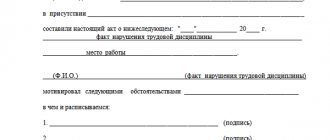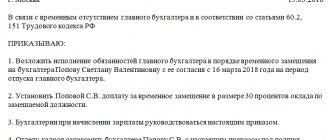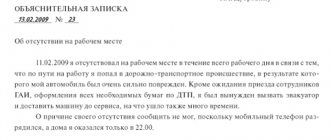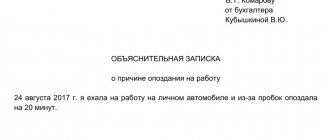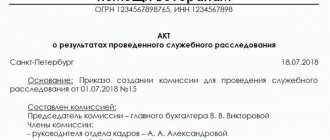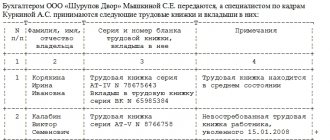Job responsibilities
According to Art. 21, 189 of the Labor Code of the Russian Federation, when applying for a job with an employer, an employee must be familiar with local regulatory acts directly related to the performance of his labor functions. Such acts include:
- Internal labor regulations;
- Collective agreement;
- employment contract;
- job description;
- labor safety instructions and other documents at the discretion of the employer.
When reviewing the documents and, accordingly, the job duties, the employee is warned of liability for failure to fulfill these duties, as well as for improper performance.
In case of violation of official duties, the employer has the right to apply to the employee, depending on the severity of the offense, one of three types of disciplinary punishments (stipulated in Article 192 of the Labor Code of the Russian Federation):
Please note that punishments can only be applied separately (for example, a reprimand and a reprimand cannot be applied simultaneously).
Since labor disputes quite often end up in the courtroom, it is important for the employer to ensure that the punishment is lawful and appropriate to the offense. For this purpose, the organization is developing a Procedure for bringing employees to disciplinary liability, which stipulates the entire procedure for holding an employee accountable.
A breach of duty report is the first step in conducting an investigation into misconduct.
To whom is it provided for review?
There are two types of acts: internal and external.
Heads of offices, divisions or the company as a whole (depending on who they are intended for) become familiar with the internal regulations. And then the bosses decide whether to take any disciplinary action against a particular specialist or not.
If the act is external, then it is understood that a representative of the controlling organization gets acquainted with it.
There are situations when such documents are drawn up for the manager, and their purpose is to additionally verify the organization’s documents, forms and methods of work, etc.
How to draw up an act
The act is drawn up by commission, in the presence of the employee who committed the offense. The commission, as a rule, includes the head of the department in which the employee who committed the offense works, a lawyer or HR specialist, and other employees of the department. The main condition is the presence of at least three people on the commission.
The employee must read the act (or its contents must be read to him), after which he must put his signature and date on the act, confirming the fact of familiarization.
As practice shows, employees do not always agree to sign the act, especially if the matter concerns a gross violation of official duties. This is partly due to the opinion floating around the Internet that if you do not sign the act, then the employee cannot be held accountable. However, this opinion is erroneous. Refusal to sign the act is not an obstacle to bringing the employee to justice.
If an employee refuses to sign the act (read the act), the commission draws up an act of refusal to familiarize itself with the act. The act is signed by the same commission members as the original one.
After drawing up the report, the employee is given two days to provide a written explanation to the employer regarding the offense committed. If explanations are not provided, another act is drawn up - about refusal to give explanations.
Components of the act
The act is located on one sheet (if possible) and begins with the name of the organization at the top. This is followed by the city of compilation and the date. Then - the full name of the document itself in the middle of the sheet.
After the header there is a detailed description, including:
- Full name of the persons who drew up the act. The paper is written in a single person (“by me, …”). The remaining witnesses and participants in the preparation of the act (who sign) are also listed at the very beginning. It is noted that they were present during the preparation and fully agree with the information provided through the act.
- Full name of the offender.
- A statement of facts regarding the order, instruction, direction that was given to the employee. Dates, numbers, numbers. The more accurate and measurable information is presented, the better. There is no place for expressive expressions or artistic techniques.
- A description of how the violation (or several) occurred. A link to the job description would be helpful.
- Disclosure of data about what the employee’s behavior led to (expenses, accidents, deterioration of the situation, etc.).
- Information about whether the employee was asked to draw up an explanatory note.
At the end, the drafters of the act leave their signatures. If this is possible, then take the signature of the person who did not fulfill official duties (or did not perform them systematically). In case of refusal to put a signature, a footnote of the corresponding content is made in the act.
Read more: Sick leave on the day of dismissal by agreement of the parties
Form of report on violation of official duties
There is no statutory form for an act of violation of official duties. The enterprise usually develops and approves, within the framework of the Regulations on Internal Inspections or other local regulatory acts, forms of these documents, which the employee who committed the violation will be asked to use.
On our website there is a sample act of violation of official duties, which you can use, individualizing it to suit your needs.
The act of violation of official duties must contain the following structural elements:
- date and place of drawing up the act, time of drawing up the act, name of the document and its number;
- information about the commission that draws up the act, indicating positions, structural units, full names;
- information about the reason for drawing up the act: “an act was drawn up stating that the contract department engineer Larisa Pavlovna Volkova was absent from the workplace without a good reason for more than 4 hours in a row”;
- the act also sets out all relevant circumstances that could contribute to a more accurate classification of the offense;
- The act is completed with the signatures of the commission members and the signature of the employee who committed the offense.
The report is stored together with other materials related to the misconduct, and is indicated as the basis (together with the employee’s explanations) for drawing up an order to bring the employee to disciplinary liability.
Zen! Zen! Zen! Our Yandex Zen channel has even more special legal materials in a convenient and beautiful format. Subscribe now →
Act of refusal to sign the act
13969 is formed in a variety of situations.
For example, in cases where an employee of an organization, in respect of whom an act of violation of labor discipline was previously drawn up, for some reason refuses to sign it, or, for example, the customer refuses to endorse the act of putting the facility into operation.
It happens that one party does not want to sign premises, any property, or the provision of services, etc. FILES Any deed is always signed by at least two parties. Sometimes, to draw up and sign a particular act, entire commissions are involved, which include employees of different structural divisions or representatives of various companies - all of them are required to sign the document.
Their autographs indicate that the information included in the act is correct, the parties are familiar with it and agree with it. But if one of the parties
Drawing up an act of violation of official duties
Each employee is obliged to fulfill his job duties. When hired, a person is given a number of tasks that he must complete during the working day. In case of violation of the contract, the employer has the right to draw up an act of violation of official duties. The act states the facts of violation of the rules established in the organization or enterprise and non-compliance with the prescribed instructions.
The legislative framework
According to Article 21 of the Labor Code of the Russian Federation, the employee is obliged to:
- Perform your job duties in good faith;
- Follow the established work schedule;
- Adhere to labor discipline standards;
- Comply with prescribed labor standards;
- Comply with labor protection requirements;
- Treat the property of work colleagues and superiors with care;
- Immediately report to management any situations that threaten the health and lives of people, as well as property.
Documents regulating violation of official duties:
- employment contract,
- job descriptions,
- regulations.
The employee must be familiarized with these documents against signature.
Type of violations
The most common types of violation of official duties:
- Absence from work (absenteeism). It is considered a violation if an employee is absent from work for more than 4 hours without a valid reason.
- If during working hours the employee is under the influence of drugs, toxic or alcoholic intoxication.
- Failure to comply with and fulfill the duties prescribed in the employment contract or other acts with job descriptions or performing them untimely and of poor quality.
- Failure to comply with and failure to comply with orders from superiors, orders of the employer, or their implementation untimely and of poor quality.
If an employer notices one of the above violations in his employee, then he has the right to impose a disciplinary sanction under Article 192 of the Labor Code of the Russian Federation. Management has the right to reprimand, reprimand or dismiss an employee.
Step-by-step procedure for dismissal for failure to fulfill job duties
One of the grounds for dismissal at the initiative of the employer is dismissal due to repeated failure to fulfill job duties, if the employee has a disciplinary sanction (clause 5, part 1, article 81 of the Labor Code of the Russian Federation). However, when terminating an employment contract on this basis, the employer often makes mistakes, due to which the employee can be reinstated in his previous position. In this article we will consider in detail the procedure for dismissing a negligent employee, and also focus on its individual points.
When is a violation report issued?
An act of violation of official duties is drawn up upon the commission of a violation.
Cases of drawing up an act of violation of labor discipline:
- the employee skips or is late for work systematically, even after several warnings (in this case, a report of being late for work is drawn up);
- the employee systematically drinks during working hours or appears at the workplace drunk or under the influence of drugs;
- there have already been several warnings about the employee’s poor quality and untimely work, or he refuses to perform the work specified in his employment contract;
- the employee refuses to carry out instructions from his superiors (if they are made during working hours and correspond to the employee’s duties) and challenges orders;
- failure to comply with health instructions.
The document is drawn up by the personnel department or directly by the manager, with the involvement of personnel department employees.
They are obliged to notify the employee and familiarize them with the document against receipt. If the employee refuses to sign for the violation committed, then a corresponding note is made in the document and all drafters and those present sign again.
If an employee appears at the workplace during working hours in a state of alcoholic intoxication or under the influence of toxic or narcotic substances, then the report is drawn up on the same day, but the employee can familiarize himself with it only the next day, as he is incapacitated. In such cases, medical reports or other compelling evidence of the violation are also required. In the act, the drafters describe the employee’s condition: the degree of his intoxication and adequacy.
Registration of the act
The act of violation of official duties includes:
- Date and place. The document must be drawn up on the same day that the offense was committed, so the exact date is important. If the employee was late or did not show up at work, then the exact time should also be indicated.
- Full names and positions of all document compilers. This could be management and personnel department employees.
- Full name and position of the employee who committed the violation of official duties.
- What is the violation, details of the circumstances.
- Explanations of the employee who was activated and committed the violation. Explanations are recorded in any form, but without obscene expressions. If there are any, this should also be noted in the act.
- Signatures of all those present during the preparation of the document.
- Signature of the person who drew up the act.
- After familiarization with the employee, his signature. Or a note that the employee refused to sign.
you can follow the link:
It was developed in accordance with all norms and procedures of the law; the sample can be of assistance in drawing up an act of violation of official duties.
Certificate of refusal to sign a dismissal order
934 In order to dismiss an employee according to all the rules, it is necessary to draw up a special order in the form. The dismissed employee must read it and sign it. It is not always possible for the management of an organization to obtain an “autograph” of an employee.
To protect themselves and prove that information about the dismissal was conveyed to the employee, management must draw up an act of refusal to sign the dismissal order.
FILES You have to resort to drawing up this document if the employee does not agree with his dismissal.
For example, if termination of an employment contract occurs at the initiative of the employer (often in cases of committing an immoral offense, violating labor protection requirements, appearing at work while intoxicated, etc.). If an employee decides to go to court or the labor inspectorate and argue his claim with the fact that the employer did not notify him of his dismissal, then the act will be evidence to the contrary.
How is the document stored?
After correct execution of the document and compliance with all standards, if the employee’s guilt is proven, the employer has the right to order the recovery of the employee. If the employee was not at fault, but still received a penalty, then he can go to court.
After the act is drawn up, it is recorded in the internal documentation journal. After the employee’s guilt is confirmed, the documents, along with an order from the employer for disciplinary action, are sent to the administrative documentation folder.
The relevance of the act depends on whether the employee’s guilt was recognized. As time passes, the documents are transferred to the archives of the enterprise. They are stored in the archive according to the standards established by the internal local regulations of the company. If there are no such standards, then the shelf life is established by the legislation of the Russian Federation. Documents are stored for at least three years.
Consequences of drawing up an act
After a year has passed after the disciplinary sanction (not dismissal), the employer checks whether the employee has yet committed any violations and whether he has received other penalties. If the employee is not accused of anything else, then the authorities will remove the disciplinary sanction from him. It can be removed before the end of the year on the manager’s own initiative, his or a representative body’s petition, or at the request of the employee himself.
A document on early removal of a penalty from an employee is drawn up and signed directly by the manager. The reason for the withdrawal, the number and date of the document on the imposition of penalties must be indicated there.
Is it possible to appeal an act of violation of official duties?
If an employee claims that the act is unfounded, he has the right to appeal it. This is possible under Article 193 of the Labor Code of the Russian Federation and the appeal should be documented and brought to the state labor inspectorate or to the bodies for considering individual labor disputes.
Failure to comply with the Labor Code is strictly punishable. It prohibits the imposition of penalties or the application of disciplinary sanctions that do not comply with federal laws, the Labor Code itself and statutes.
If management does not comply with the Labor Code, this may result in administrative liability in the form of a fine.
- For officials, penalties range from 1,000 to 5,000 rubles;
- For legal entities - from 30,000 to 50,000 rubles.
An employee is protected by the legislation of the Russian Federation and can defend his own rights by appealing the imposition of an act of violation of official duties.
In what cases is it legal to issue a reprimand?
As mentioned earlier, labor legislation does not rank employee misconduct by severity, nor does it provide a list of violations of labor duties for which the manager punishes employees with a reprimand or reprimand.
The final decision on the type of penalty applied remains with the management of the organization after a thorough study of the offense. Also, you cannot punish an employee for the same thing with different disciplinary measures; the rule is appropriate here: one offense - one punishment.
Information about a reprimand can be entered into the employee’s personal card, but such information is not recorded in the work book.
Failure to comply with the registration rules, deadlines for preparation and review is a reason for challenging the imposition of a penalty. The employee has the right to appeal to the state labor inspectorate, labor dispute commission or court.
Read about the reinstatement of an illegally dismissed employee here
Do I need to file instructions if instructions are not followed properly?
An act of the specified sample is drawn up in a situation where a citizen employed on an official basis performed his work inappropriately, or completely deviated from fulfilling the powers assigned to him.
The act of improper performance of official duties or failure to fulfill them and the memo have a number of similar characteristics.
A distinctive feature of the first is that its registration must be carried out in the presence of a special commission, the members of which are witnesses to the commission of an offense. The commission must include 3 or more employees.
The need to compile this form occurs when the following violations of production discipline are identified:
- the employee commits actions that contradict the current Labor Legislation;
- the employee’s refusal to comply with the employer’s instructions and duties prescribed by the job description (if the issuance of orders from the manager is permitted by the employment contract);
- missing job description;
- the employee’s inaction at a time when his actions could have prevented an emergency or other similar event;
- absenteeism, being late, etc.
Violations of the listed types can be committed either once or systematically. For registration, it is enough to identify at least one offense.
Who will account for a violation in the form of failure by an employee to fulfill his duties?
Responsibility for drawing up reports in case of failure to fulfill duties in most cases rests with employees holding management positions, for example, heads of structural divisions.
HR specialists can also bring the employee to punishment.
After completing the document, the employees who took part in its preparation notify the employee who is not performing official duties about the creation of the act.
He must familiarize himself with the data indicated on the paper, and then leave his signature on it. If a refusal is received, the drafters of the document make the appropriate one.
It is important to take into account some nuances. For example, if the act was written because an employee appeared at work in a state of any kind of intoxication, he cannot study the contents of the document on the day the offense was committed.
The thing is that at that moment he is recognized as incompetent. In this case, the citizen can familiarize himself with the document only the next day.
If the documentation is drawn up due to improper execution of the provisions of the job description, then the contents of this document should be immediately conveyed to the employee.
Design rules
When drawing up an act of failure to properly fulfill official duties, you do not need to use any unified form.
To fill out the paper, you can use a sample developed by the company’s specialists.
Free style writing is also allowed.
If possible, the act should be drawn up on one sheet of paper. The optimal version of its format is A4. In the header of the document, it is important to indicate the exact name of the company, as well as the city in which the form is issued and the date of its preparation. The name of the paper is written in the middle of the sheet.
The main part follows. It must include the following information:
- the initials and positions of the persons included in the commission, with the participation and under whose control the act was drawn up. The story is told by one specialist. The rest sign the document, thereby confirming that the selected citizen represents the interests of all listed employees;
- position and initials of the employee who failed to fulfill official duties;
- description of the document on the basis of which the violator must perform his official duties. This could be an employment contract, instructions, etc.;
- a detailed statement of the essence of the violation - what exactly was the improper performance or failure to fulfill duties. If there is a job description whose rules have been violated, a reference is made to this document;
- a listing of the consequences that resulted from the employee’s misconduct. For example, an accident, a deterioration in the company’s position, unexpected production costs;
- information about the presence or absence of an explanatory note. You should also indicate whether the employee received an offer to provide it.
At the end of the document, all specialists who took part in its preparation put their signatures on it. They act as confirmation that they fully agree with the information reflected.
The offender must also sign the act. If he refuses to perform this action, the fact of refusal is recorded in the document.
The completed act is handed over to the employer. After studying the paper, the head of the company must conduct an inspection, during which the fact of an offense will be confirmed or denied.
If, based on the results of the investigation, the employee’s guilt is proven, the employer has the right to impose a disciplinary sanction on him. The decision on the type of punishment is made by the manager independently; to impose a penalty, an order of this type is drawn up.
act on improper performance by an employee of his duties - word.
This is what the sample looks like:
How to issue a disciplinary order
It is important that the order for violation of duties and disciplinary action be legally formalized. Any error or omission may become a reason for declaring the document illegal and canceling the punishment. When drawing up an order, it is necessary to comply with its regulatory structure:
- Introduction. Here you must indicate the details of the employee to whom the penalty is directed. You also need to provide the details of the company. The order can be made on letterhead with the organization’s logo.
- It is important to indicate in the document the date and place of drawing up the act of violation.
- Descriptive part. A statement of all the circumstances of the precedent. It is necessary to describe what the violation of official duties is.
- An indication of the clauses of the employment contract or job description that were violated.
- Signature of the head of the organization. Its necessity is enshrined in Article 193 of the Labor Code of the Russian Federation.
- It is necessary to provide the composition of the commission and affix the signatures of each of its members. The commission must have at least three people.
- Rationale. The punishment should be justified by one or another norm of the Labor Code of the Russian Federation. The administrative act must provide a reference to the legislative provision giving the employer grounds for punishing the employee in a particular case.
After drawing up the document, you need to familiarize the offender with it. The order must indicate the date of review. The act of punishment is provided to its addressee immediately after drawing up and endorsement. The employee is officially given 3 days to sign the order. If he is temporarily away from work, then this period is extended for another 3 or more days.
When an employee refuses to read and sign a document, it must be sent to him by registered mail with mandatory notification. In this case, the signatures of the commission members will be quite sufficient for the order to have full legal force.
Once a year has passed since the breach of duty order was issued, it may be dismissed due to the expiration of the statute of limitations. This occurs provided that during this time no other claims have arisen against the employee.
In some cases, the imposed penalty can be lifted ahead of schedule, at any time. To do this, the employer must issue another order to remove the imposed liability.
It must indicate the reasons for making such a decision and other circumstances related in one way or another to the incident. After the issuance and certification of this order, responsibility from the employee is completely removed.
Expert opinion
Mikhailov Vladislav Ivanovich
Lawyer with 6 years of experience. Specializes in family law. Knows everything about the law.
An act of failure to fulfill official duties is a document on the basis of which the employer conducts an investigation into a violation of labor discipline committed by an employee.
The procedure for drawing up a paper has a number of features that must be observed in the process of its preparation.
- Do I need to file instructions if instructions are not followed properly?
- Who will account for a violation in the form of failure by an employee to fulfill his duties?
- Design rules
- Useful video
- conclusions
conclusions
An act of failure to fulfill official duties is an effective method of recording violations of discipline established by the company’s internal documentation.
Papers of this type are the basis for the employer to conduct an investigation into the commission of an offense.
The document is drawn up in the presence of a specially assembled commission, the minimum number of members of which should not be less than 3.
In case of systematic violation of labor discipline and when gross misconduct is committed, the most severe punishment may be applied to the employee. This is generally considered to be dismissal.
When you can't punish
It is impossible to punish an employee for failure to fulfill official duties if he has a good reason, which means there is no guilt. For example, neighbors flooded, the elevator broke down, a child got sick, the employer himself did not take the necessary measures to preserve his property, and it was stolen, but not through the fault of the employee, etc. It is also illegal to apply penalties in the following cases:
- refusal to work that poses a threat to life and health (Article 220 of the Labor Code of the Russian Federation);
- participation in a legal strike of workers (Articles 413 – 414 of the Labor Code of the Russian Federation);
- refusal to perform duties not specified in the instructions (Article 56 of the Labor Code of the Russian Federation).
What is considered non-compliance with work discipline?
Article 189 of the Labor Code of the Russian Federation establishes that labor discipline is a set of rules that every employee must follow and which are contained in the following sources:
- Labor Code of the Russian Federation and federal laws;
- employment contract;
- internal labor regulations;
- job description;
- labor protection acts;
- local regulations adopted by the organization.
Thus, failure by an employee to comply with the rules adopted by the enterprise is regarded as improper performance of official duties. Among the most common offenses are:
- violation of the work schedule (lateness, absenteeism, leaving work early);
- failure to fully perform official duties;
- coming to work in a state of alcohol or any other intoxication;
- ignoring labor safety standards;
- ignoring the orders of the manager;
- theft or damage to the organization's property;
- refusal to undergo training to improve the employee’s qualifications;
- refusal to undergo a medical examination;
- inconsistency of work results with established quality criteria.
Such behavior entails sanctions such as reprimand, reprimand or dismissal (for gross violations established by Article 81 of the Labor Code of the Russian Federation).
But management does not always impose any punishment on a subordinate. Sometimes the director may limit himself to a verbal warning if the offense has been committed for the first time and the employee has a good character reference.
However, before imposing a punishment, the employer must establish whether there has been a case of misconduct and prove the guilt of the offender. This procedure has a procedure established by law and must be accompanied by an appropriate document, otherwise the collection may be considered illegal.
Employer control
The employer has the right to monitor compliance with labor regulations at the enterprise and, having identified a violation of established standards, work with both individual workers and the team as a whole. It is necessary to pay attention to identified small deviations and provide comments on the employer’s actions to eliminate them. They should not be ignored, because small cases can be repeated and turn into a major problem.
The employer’s control is aimed at preventing violations of labor regulations in the field of:
- established labor protection rules;
- absenteeism;
- being late;
- leaving work before a certain time;
- theft;
- refusal to perform the duties of the position.
These are the violations for which employees are held accountable in the form of disciplinary action. However, monitoring deviations in labor discipline involves examining all the circumstances and reasons, which is reflected both in the violator’s explanatory note and in the act.
Read more: Permissible level of alcohol in exhaled air
How to draw up an act of violation of labor discipline
The act in question confirms the misconduct committed by the employee and is the basis for the application of appropriate sanctions. The form of the act of violation of labor discipline is not unified by current legislation, however, when drawing it up, the following information must be reflected:
- date and time of compilation;
- FULL NAME. the official who executed the act;
- FULL NAME. and positions of persons present during the formation of the document;
- FULL NAME. and the position of the offender;
- the essence of the offense committed;
- explanations of the employee regarding the violation;
- signatures of all persons present during registration, including the culprit.
The collection process consists of the following steps:
- An act of violation of labor discipline is drawn up.
- The employee is required to write an explanatory note in which he must state the reason for the offense.
- A violation order is issued. There is no fixed form, but the document must contain information about the offense, the date it was committed, the type of penalty and supporting documents.
A report from his immediate supervisor (if available) must be attached to the form.
According to Article 193 of the Labor Code of the Russian Federation, before the official application of punishment, the head of the company must request an explanatory statement from the accused employee. If he does not provide it, a report is drawn up, after which a decision on punishment is made. When preparing a document, you should be careful, writing down all the nuances and details, including the explanations of the employee himself. In case of violations of the act, the employee will have the right to sue.
It is worth noting that, in accordance with Article 193 of the Labor Code of the Russian Federation, the employee has two days to provide his explanations. If he refuses this, as well as the obligation to sign the document, another corresponding document must be drawn up in the presence of witnesses. After writing the act, it must be signed by everyone present, including the violator himself. If he refused to do this, a note must be made in the document.
After completing this procedure, the employer issues an order to apply the selected disciplinary sanction, and the personnel service attaches all these documents to the employee’s personal file and stores it until the end of the employment relationship with him.
Procedure for applying penalties
The rules for applying a particular disciplinary sanction are described in Art. 193 of the Labor Code of the Russian Federation, according to which any punitive measure is accompanied by the issuance of an appropriate order. By law, before classifying an action as a misdemeanor, the employer is required to request an explanation from the employee who committed it. The refusal to give an explanation is recorded by drawing up an act and, according to Art. 193 of the Labor Code of the Russian Federation, cannot interfere with the application of disciplinary measures. The period for providing an explanatory note does not exceed two working days. In addition, the Labor Code provides for other terms for the application of penalties:
- no more than one month after discovery of the violation;
- no more than six months after the violation was committed;
- no more than two years after the discovery of the misconduct based on the results of an inspection by an auditor or auditor.
It is important to remember that, in accordance with the Labor Code of the Russian Federation, a reprimand as a disciplinary sanction can be applied once for one specific violation (Article 193 of the Labor Code of the Russian Federation).
